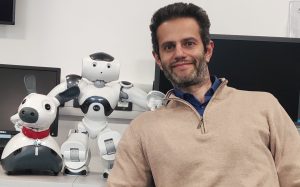Prof. Di Nuovo shares his dream of creating a hub for fundamental and applied research in AI & robotics
It’s another Spotlight edition!
Our Spotlight articles aim to shine a light on the people that make up the Industry and Innovation Research Institute (I2Ri). Alongside the BreakThru Research podcasts on Spotify hosted by Márjory Da Costa-Abreu, we hope this will be a great way to celebrate our successes and get to know our researchers more.
This edition, we caught up with Professor Alessandro Di Nuovo to find out a bit more about him and his work in I2Ri.

Professor of Machine Intelligence
“The ultimate goal is to help people, and I’d like to do this by creating a hub for fundamental and applied research that also serves as an AI & robotics education centre, where students and the workforce can learn about and embrace new AI and robotics technologies.”
Please can you tell us a bit about yourself?
My name is Alessandro Di Nuovo and I’m a Professor of Machine Intelligence. I also lead the Smart Interactive Technologies (SIT) Research Laboratory and the AI, Robotics and Digital research theme at the Advanced Wellbeing Research Institute.
What path led to your current work and working at SHU?
I got my PhD from the University of Catania (Italy) in Computational Intelligence for hardware/software co-design. I then started looking at AI applications for robotics and began collaborating with the University of Plymouth.
An opportunity came up in Plymouth to work on a four-year European project looking at how we can use robots in the home to support older adults to live more independent, longer, healthier lives.
Through this project I fell in love with robotics, so I started looking into other robotics research labs in the UK and I was fortunate enough to receive a position in Sheffield.
Thanks to the support of the department and colleagues from other areas of the university, I have been able to progress my career here at SHU.
What is the most exciting thing about your work? What are some of the challenges?
I enjoy engaging with different users, stakeholders and other people who are interested in knowing more about AI.
One of the main challenges in my field is public perception of AI. There is a tendency to associate AI and robotics with science-fiction stories like The Terminator, where there is usually a negative impact on humans. This is not true at all, so I try to be an ambassador for the field by engaging with people to explain what we do.
I find they are actually very happy to work with us once we have explained more, so it is important to reach as many people as possible and give them the opportunity to experience the reality of our work.
What advice would you give to someone who was looking to embark on a career in research?
It’s very important to be passionate about what you do. There will be ups and downs and many sacrifices so it’s easy to give up, but if you are passionate about your work and you persevere, you will succeed.
What do you most enjoy about your work?
I’m lucky to be able to work on both fundamental and applied research, and I particularly enjoy creating things that are adapted to and useful for people.
At SHU there is a lot of opportunity to collaborate, which is important. At the AWRC I get to develop real-world applications of my work for the healthcare sector and it’s great to take the technology out of the lab and into the real world.
What are your ambitions and the next steps for the research?
The ultimate goal is to help people, and I’d like to do this by creating a hub for fundamental and applied research that also serves as an AI & robotics education centre, where students and the workforce can learn about and embrace new AI and robotics technologies.
I’d like the focus to be on knowledge exchange, so we can create opportunities to collaborate directly with industry to help drive innovation.
Overall, I want to help Sheffield become an international leader in AI and robotics innovation, with a particular focus on health.
Is there an opportunity for colleagues to collaborate with you on your research?
Absolutely. The work we do is transdisciplinary and we are always happy to collaborate either on the application side or the fundamental side.
What do you like to do when you’re not working on your research? And when you are not working?
I love to travel and explore the beauty of the world, know other cultures, experience new things. I also enjoy walking in Sheffield and other nearby areas, but growing up in Sicily I miss the sea, which is one of the reasons why I like to go abroad.
